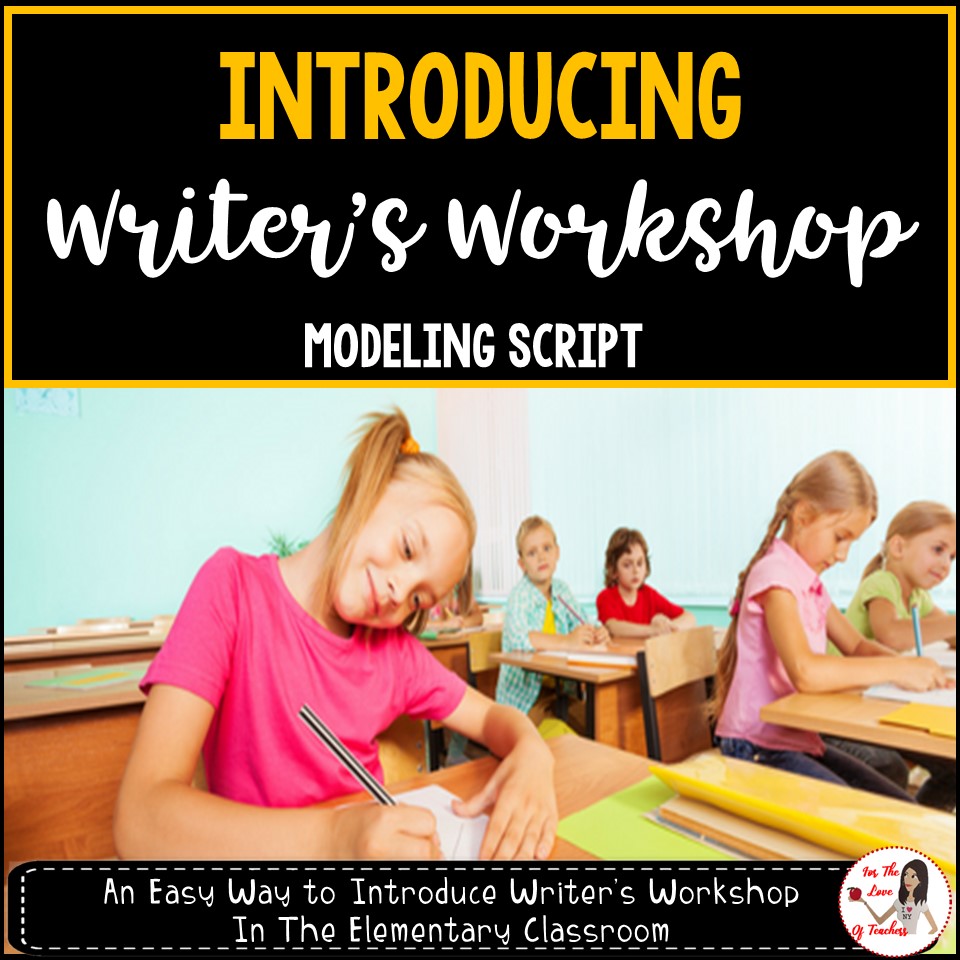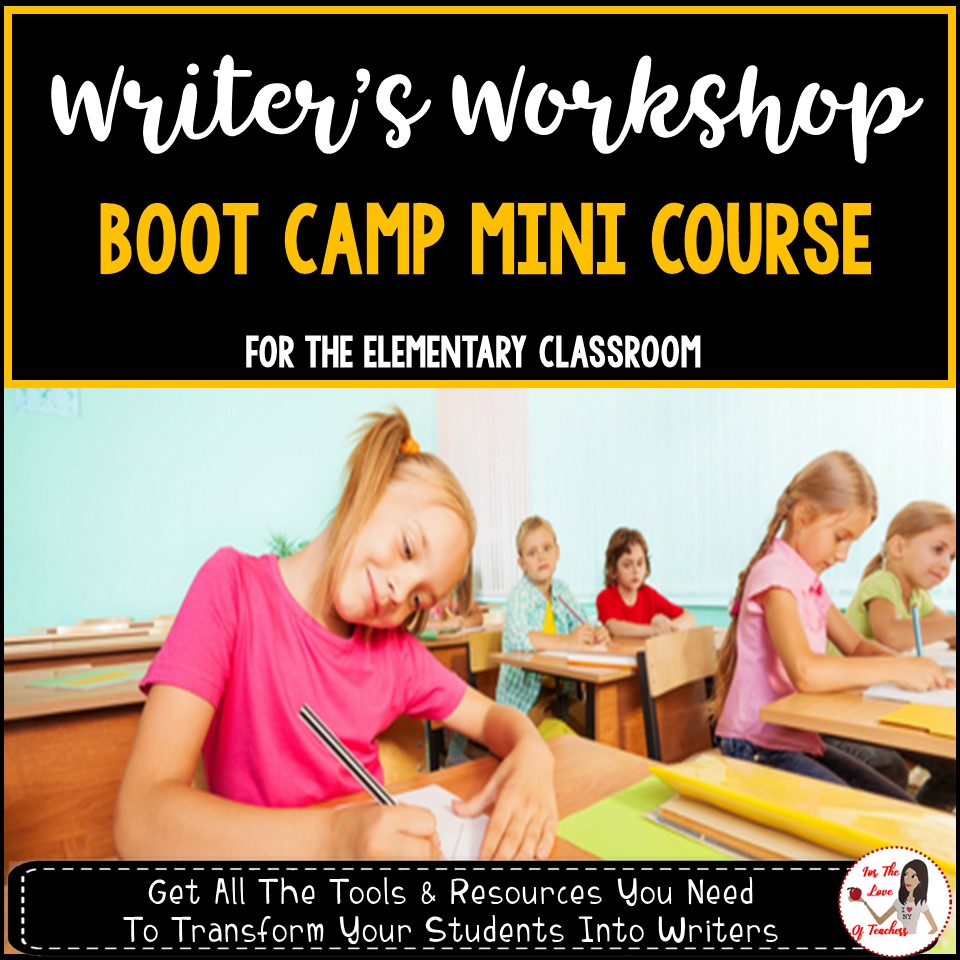Teaching writing and writing in itself is an absolute passion of mine. But not for many teachers, as well as students. In my opinion, writing is probably one of the hardest subjects to “teach” and is dwindling quickly out of schools altogether. Why? Because writing is personal and emotional and it can be difficult to teach. And to be quite honest, writing is not “tested” in some school districts in some states, which leaves some wiggle room for neglecting it a bit. So why teach writing and how do we transform our students into writers?
Why?
We teach writing because it is an essential line of communication. We teach writing because it is an expression of one’s thoughts and feelings. We teach writing because it is a life skill. When we are teaching writing, we are teaching students the process of thinking. The transfer of thoughts from the brain to the hand, and on the paper is truly an amazing process, which we as teachers need to help students develop further. And writing applies to all professions. As I think about all the subjects that we teach and with the growing focus on STEM/STEAM to prepare our students for unforeseeable jobs in the future, it is critical to add a “W” somewhere in that acronym. Writing the steps of thought processes and rewriting and redesigning is what makes STEM what it is. If you missed one of my previous posts, Step Up STEM with Writing, you could check it out here. And of course, all good teachers integrate writing in all subject areas. But there is more than integration. There are so many writing skills and strategies that we need to directly teach our students in order for them to write like writers, think like writers, and to transform into writers.
How?
In order to teach writing and to transform your students into writers, you’ll need to become a writer yourself. It is the absolute #1 way to get student buy-in to writing. I know many teachers who strongly dislike teaching writing and writing in front of their students, never mind sharing their own writing pieces. But to instill that passion of writing in your students and to help transform them into writers, you must set the example. Now I know that this is challenging for many teachers. Teachers are reluctant to share their writing with others because writing can be very personal and tedious. But you will find that your students will be your best audience. They will love what you write, praise your writing, and will be your best critics. I start off each year with teaching personal narratives as our first unit of study. I use my own writing as mentor texts. I shared a piece about a person who really matters to me, my grandmother. When I asked for feedback from my students (my personal writing coaches), I’ll never forget the little boy in my class who raised his hand and said, “Your story about your grandmother warmed my heart.” That had to be the best feedback I ever got. He got it, he felt my writing. What I wrote touched his little heart. Even if my writing piece was not even that “good,” my students think I am the best writer. They even named me the “Writing Fairy.” 😉

Another key way to transform your students into writers is to implement Writer’s Workshop in your classroom. Writing Like Writers is the name of the Writer’s Workshop in my classroom, named after one of my favorite resources, Writing Like Writers: Guiding Elementary Children through a Writer’s Workshop , that encourages all students to think of themselves as writers. We begin the year off with creating the rules, routines, and expectations for our workshop that establishes an environment where writers feel safe and comfortable writing about topics they want to write about. The key to getting students to write is giving them choices about what to write about. Choice motivates students to write. Help your students to discover their passions to share with others. All children have something they are passionate about. They all have stories to tell that are meaningful to them. When you help them find those stories within themselves you will find that your students will become writers.
, that encourages all students to think of themselves as writers. We begin the year off with creating the rules, routines, and expectations for our workshop that establishes an environment where writers feel safe and comfortable writing about topics they want to write about. The key to getting students to write is giving them choices about what to write about. Choice motivates students to write. Help your students to discover their passions to share with others. All children have something they are passionate about. They all have stories to tell that are meaningful to them. When you help them find those stories within themselves you will find that your students will become writers.
Key Elements of the Writer’s Workshop Process That Transforms Your Students Into Writers
-
Students determine the topics and form of their writing (CHOICE).
-
Students keep a writer’s journal to organize their “in progress” writing.
-
Class members are at different points in their writing. Some may be pre-writing while others are at the editing stage (Students work at their own pace).
-
The teacher’s role is that of the facilitator: monitoring, encouraging, conferring, and providing help as needed, teaching the writer, not the writing.
-
Students peer conference with each other for the purpose of improving their writing (peer writing coaching creates a community of writers).
-
Students have time to orally share their writing (celebrate and acknowledge each other’s work).
-
The teacher meets with individual students to conference about their writing throughout the process (individualized attention and instruction).
-
The teacher may meet with a small group to teach a skill or strategy (differentiated instruction).
Organizing the Classroom for Writer’s Workshop
Before you teach your writers, you’ll need to have a Writer’s Workshop ready classroom by:
-
Setting the tone and stage for the classroom environment for writing.
-
Modeling and teaching exact routines and procedures.
-
Establishing the physical space in the classroom for materials and the components of Writer’s Workshop.
Don’t know how to do this or need more help? Check out my video tutorial How To Organize and Manage Writer’s Workshop (K-5) and this script, Introducing Writer’s Workshop, which will help you get started. OR get both of these, plus more tips, tricks, and resources in my Writer’s Workshop Boot Camp. Read all about the boot camp here.

Finally, follow with this fantastic resource, First 20 days of Writing Workshop and my Personal Narratives writing unit with visual graphic organizers, teacher examples to use for whole group lessons, discussions and peer activities, along with checklists, publishing paper and a rubric. Check this out here. You’ll have a rockin’ Writer’s Workshop up and running and your students will transform into the writers you hope them to be.
Missed this post…4 Ways To Get Your Students To LOVE Writing? Read it here.
Be sure to join the forums to collaborate with other AMAZING teachers! Follow me to be notified when new resources are uploaded to the Shop and join the email list to receive the latest and greatest updates, posts, and monthly freebies!
If you like it, then pin!



Christine Weis is a passionate educator, classroom management coach, wife, and mom of two busy boys. She enjoys teaching, writing, and creating resources for teachers.





I can’t wait to implement these ideas to my baby who is only 10 months. This was a very insightful post to read!! Thanks for sharing this information with all of us!
Good idea! I teach active listening strategies to my own kids too. I’m glad you found this post helpful! Thanks for reading!
Christine at For The Love of Teachers
This is such a wonderful post! Writing is so important for communication, and when children learn how to write effectively, it’s super empowering for them! Great article.
Thank you! I agree! Writing is such an important communication skills and is definitely empowering. Thanks for reading!
Christine at For The Love of Teachers
Great post. Learning proper grammar is essential in the long run that will help with their education and job.
Good point Luci! There are so many kids and adults that haven’t learned proper grammar! Thanks for reading!
Christine at For The Love of Teachers
Sounds like an interesting course for a very important topic!
Thanks Anna! Thanks for reading!
Christine at For The Love of Teachers
This looks like a great writing tool!
Thanks for reading!
Christine at For The Love of Teachers
I couldn’t agree more with you. As a kid I used to love writing. That was the only way I knew how to express myself. It is definitely a skill which kids can gain from.
❥ tanvii.com
Thanks Tanvi! I’m glad you had an outlet to express yourself. Thanks for reading!
Christine at For The Love of Teachers
You are correct is saying that Writing is often neglected. It’s ironic though, because it is truly one of my students’ favorite part of their day! Thank you for taking the time to share this information. As always, helpful! <3
I’m so glad that your students love writing. Mine do too! I think that’s because of our enthusiasm for writing. The kids really need that and feed off of it. we have to spread our writing magic so it is not neglected. Thanks for reading!
Christine at For the Love of Teachers
True, it is definitely a life skill. Glad my mom became my teacher for this part 🙂 Lovely post.
It sure is! Thank you for reading and thank your mom for her years of service in teaching. 🙂
Christine at For The Love of Teachers
What an amazing vocation, and one we really need. Where will we be without writers? No T.V. shows, movies, books, theatre. Thank you, teachers.
Great point! Writing is at the root of almost everything as it is connected to great thinking and creativity! Thank you!!!
Christine at For The Love of Teachers
This is a great post. I have a young daughter and I am always looking for ideas for educational playdates. Getting kids to write is so important.
That’s a great idea…educational playdates. They could write letters, make cards, create ads…the sky is the limit! I loved writing when I was a kid. Thanks for your comment!
Christine at For The Love of Teachers
Yes! I used to teach English as a foreign language and creative writing is so important. Thanks for sharing!
I bet creative writing is super important for ESL students. Thanks for reading Amy!
Christine at For The Love of Teachers